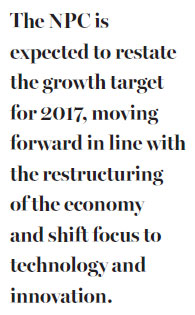The annual meetings of China's National People's Congress (NPC) and the National Committee of the Chinese People's Political Consultative Conference (CPPCC), known as two sessions, are held in Beijing beginning amid national and global anxiety over China's next course of action in the face of mounting challenges inside and outside China.
The key theme will be reforms, based on the recently adopted 13th Five-Year Plan (2016-20) development blueprint, which is meant to guide the development agenda for the next few years. Top on the agenda will be an assessment of China's growth targets in relation to economic reforms, environmental conservation and national security.
While the rest of the world is concerned with the effects of China's economic slowdown on their own economies, the world's second-largest economy has to contend with challenges related to its development agenda and targets. These include rising inequality, rapid urbanization and challenges to environmental sustainability. State leaders are continuously making policy adjustments to ensure that growth is sustainable.
During the 4th Session of the 12th National People's Congress in early March last year, the 13th Five-Year Plan was adopted, and it provides a strategy for achieving set targets to expand social protection, increase energy efficiency and reduce pollution. The annual growth target in the 12th Five-Year plan was 7 percent, but this was rebased in the 13th Five-Year Plan to 6.5 percent. The focus has shifted from quick growth to more sustainable and balanced growth. While this strategy was adopted last year, it is a gradual process and therefore remains a top priority of the Chinese government. How to sustain the process will be on the agenda. The NPC is expected to restate the growth target for 2017, moving forward in line with the restructuring of the economy and shift focus to technology and innovation.

Based on the 13th Five-Year Plan, environmental conservation appears to be a key priority for the Chinese government and policymakers, as it complements the grand plan of shifting to a more sustainable and green future. Since the last session, Chinese leaders and authorities have adopted a tough stance, with measures to contain environmental degradation and the chronic pollution problem.
During the last session, Minister of Environmental Protection Chen Jining, told reporters that "we used to think development was all about GDP, but we can't go down that road anymore. The environment is about people's livelihoods. Protecting the environment also protects productivity".
Environmental protection continues to dominate policy discussions. Just days before the 2017 New Year, the standing committee of the NPC passed China's first environmental-protection tax law. It was reported that detailed regulations for implementing the law will be issued this year and it is expected that this topic will feature in the fifth session of the 12th NPC.
Donald Trump's allegations that climate change is a Chinese fabrication and President Xi Jinping's assertions that China is committed to fighting climate change mean that China has to assume greater responsibility not just for itself but to the rest of the world that's determined to contain global warming.
Geopolitical risks and the security situation in China's periphery pose the greatest threat to economic stability. The National People's Congress cannot afford not to take these concerns into consideration when outlining its policy prescriptions for 2017 and beyond.
China's Belt and Road Initiative, for example, offers economic and diplomatic opportunities for regional and international cooperation in line with China's interests.
The author is a PhD Candidate at Fudan University. The views do not necessarily reflect those of China Daily.
